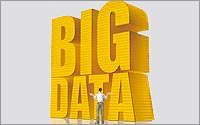Pew: Value Of 'Big Data' Debated
- by Mark Walsh @markfwal, July 20, 2012
 Madison Avenue has harnessed the power of Big Data to pinpoint the precise audiences that marketers want to reach in real time across the Web and multiple devices. In
addition to giving rise to programmatic buying, Big Data -- the growing ability to collect and analyze massive sets of information -- is having a broader impact on society.
Madison Avenue has harnessed the power of Big Data to pinpoint the precise audiences that marketers want to reach in real time across the Web and multiple devices. In
addition to giving rise to programmatic buying, Big Data -- the growing ability to collect and analyze massive sets of information -- is having a broader impact on society.
A new survey of 1,021 technology experts and stakeholders conducted by the Pew Research Center’s Internet & American Life Project and Elon University’s Imagining and Internet Center shows that most (53%) believe the emergence of Big Data is likely to be a “huge positive for society in nearly all respects” by 2020. But a significant minority (39%) contend it’s likely to be “a big negative.”
Big Data proponents predict continuing development of real-time data analysis and enhanced pattern recognition that could bring revolutionary change to personal life, business and government, according to Lee Rainie, director of the Pew Center’s Internet research arm.
Hal Varian, chief economist at Google, is among the optimists. “This is likely to lead to a better, more informed pro-active fiscal and monetary policy,” he stated. David Weinberger of Harvard University’s Berkman Center suggested we’re only beginning to understand the range of problems Big Data can help solve.
But others underscored the dark side of Big Data.
They noted that the people controlling the collection and management of large data sets are typically governments or corporations with their own agendas. Dissenters also pointed to a shortage of human curators with the tools to sort through the glut of data, increasing the possibility that data can be manipulated or misread.
As part of its report -- the seventh in a series of surveys addressing key Internet issues with a select group of experts and observers -- Pew also published a number of comments from respondents:
Jeff Jarvis, professor, pundit and blogger: “Media and regulators are demonizing Big Data and its supposed threat to privacy. Such moral panics have occurred often, thanks to changes in technology…But the moral of the story remains: There is value to found in this data, value in newfound publicness.”
Barry Parr, owner and analyst for MediaSavvy: “Better information is seldom the solution to any real-world social problems. It may be the solution to lots of business problems, but it’s unlikely that the benefits will accrue to the public. We’re more likely to lose privacy and freedom from the rise of Big Data.”
John Capone, freelance writer and journalist, former editor of MediaPost publications: “More information will be beneficial in all sorts of ways we can’t even fathom right now. Namely because we don’t have the data.”



People generally fear the unfamiliar and most people are unfamiliar/unclear on the concept of Big Data. The idea of governments tracing what you do and think is scary, but not at all what Big Data represents. It’s simply the ability to understand large amounts of complex information quickly.
Some of the most common uses today are:
- Improvement of traffic flows
- Reduction of energy consumption
- Fraud detection
- Better allocation of police force
- Recommendation engines (Netflix, amazon)
All of these can have a big brother element if you want to look at it that way, but most would argue improving these categories is a net benefit and impact society as a whole greater than any individual business.